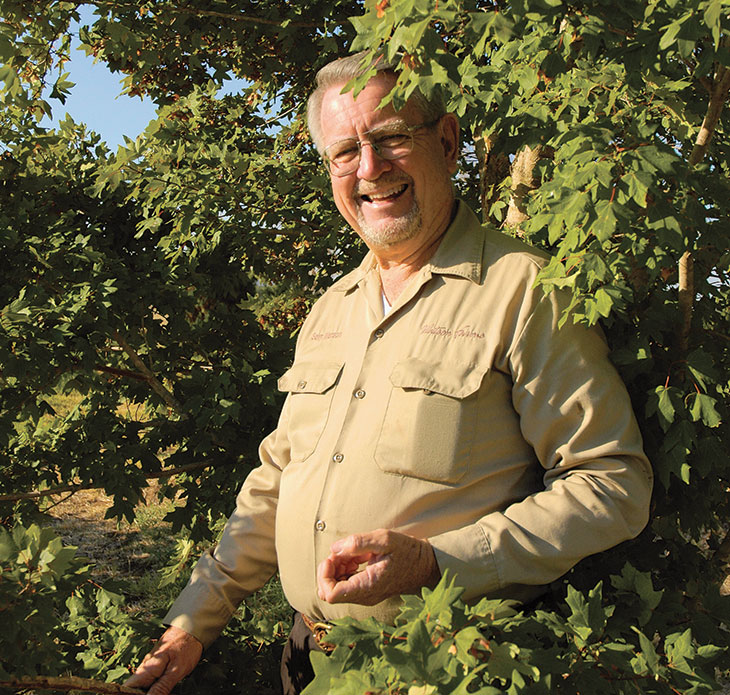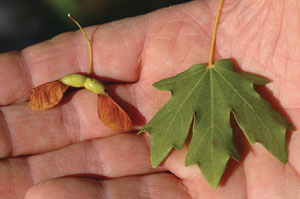
Sam Watson
Photos by Sheryl Smith-Rodgers
This year was a tough year to be in the tree nursery business in Texas. Sweltering temperatures and a severe drought damaged or killed vegetation across the Southwest.
But Sam Watson’s trees came through the summer showing only minimal stress, thanks largely to compost, mulch and drip irrigation.
“Our trees have the strongest immune system of any around,” says Sam, who operates Watson Farms near Fredericksburg, Texas, with his wife, JoAnn.
There was another contributing factor to the trees’ survival, however: Ninety percent are natives — including the bigtooth maple, the star species at Watson Farms.
Bigtooth maples — famous for their showy fall foliage — have been growing in the Texas Hill Country since the last Ice Age. More than half of the Watsons’ 3,500 trees are bigtooth maples, and of these, Sam points to one with extra pride.
“This is Mother Superior,” he beams, standing beneath the thick, leafy branches of his tallest bigtooth maple. “I bought her 10 years ago as an 8-inch-tall sapling. Now look at her!”
“Every fall, she turns a beautiful red, and, on top of that, she bears seeds,” adds Sam, who tends a variety of tree species on 15 acres east of Fredericksburg. “She’s the only one of my bigtooths that has produced seeds.”
Reaching into the tree’s green leaves, Sam plucks off a brown frond and lays the fruit in his palm. Up close, the odd seedpod resembles an upside-down whirligig with two papery wings. “Air currents can lift up and carry these seeds long distances,” he explains.
Evidently, not as far as some people would like.
Since the Watson Farms started selling trees commercially in 2001, demand from homeowners and landscapers for bigtooth maples has multiplied. All of their trees, including the non-native species, are well adapted to the Central Texas climate and soil conditions. With only a handful of nurseries in the region specializing in bigtooth maples, the Watsons usually have a waiting list of customers wanting bigtooths. But they didn’t set out to fill a niche.
“How we got into all this was an evolutionary process, not revolutionary,” Sam jokes.
Enterprising Entrepreneurs
Sam’s interest in trees took root in the early 1990s. Back then, he worked as an accounting manager for the City of Houston, and JoAnn taught elementary school. After work one afternoon, he dropped by an Arbor Day tree giveaway. Few people had come because of cold, dreary weather.
“They were about to toss 300 saplings wrapped in wet newspaper, so I offered to take them,” Sam recalls. “I potted them in 1-gallon containers and put them in our backyard.” Eventually, most went to new homes; some died.
Meanwhile, as a hobby, Sam and JoAnn spent their free time making decorative plant containers from salvaged wood to sell at craft shows. Their weekend travels across Texas led them to the Hill Country, where they came upon a property for sale in Stonewall. In January 1994, the couple bought the combination home and retail store, which fronted a major highway. Two years later, they retired and moved into the house. A few of Sam’s surviving trees in pots came, too.
Start in Stonewall
While on the board of directors of the Stonewall Chamber of Commerce, Sam met local conservationist J. David Bamberger, who had planted more than 400 bigtooth maples on his Central Texas ranch. Bamberger’s work piqued Sam’s interest in the hardy native species. Through the rancher, Sam met Baxter Adams, a commercial bigtooth grower from Medina, Texas.
“Baxter sold us larger trees,” Sam says. “Later, I learned about a propagator who sold small saplings, and subsequent visits with her netted us 1,500 saplings.” The tiny maples flourished in 1-gallon pots behind the Watson home. A few months later, “when I called to ask if she had more, she told me that she wasn’t going to grow bigtooths any more and that she had 1,100,” he says. “Right away, I said, ‘I’ll take them!’”

At left is a pair of hinged bigtooth seeds, nicknamed maple keys. The leaf, right, will turn bronze, orange or even crimson in cold weather.
Photos by Sheryl Smith-Rodgers
Back at Stonewall, more black plastic pots soon filled every available space in the Watsons’ backyard. Needing land on which to plant the trees, Sam and JoAnn purchased a seven-acre tract a few miles east of Fredericksburg in 1999. The property had one resident mesquite, a water well and 4 feet of rich topsoil. That year, the couple transplanted 3,000 trees into the ground.
Nine years later, they purchased eight adjoining acres, financing the land and farm equipment with Capital Farm Credit.
Growing Trees
Through two decades of growing trees, the Watsons have learned that good compost, mulch and soil quality are critical in the nursery business. “Naturally enriched soil along with slow, deep watering are key to a tree’s health and growth. I use low-pressure T-tape drip lines that run 1.5 gallons of water per 100 feet per hour,” Sam says.
The Watsons avoid commercial fertilizers and other products. “We actually call ourselves sustainable land stewards, not farmers,” Sam explains. “‘Sustainable’ meaning we build up the land, and ‘steward’ as in we are temporary custodians of the land. In the long run, it doesn’t matter what the deed says.”
To provide more compost for his farm, Sam started an extensive composting operation that incorporates manure from a nearby horse stable. He also mixes in residential leaves and tree debris collected in Fredericksburg.
“Four years ago, I noticed city garbage trucks hauling leaves to the local landfill,” he says. “So I suggested an idea: trees for leaves. Now the city brings me their leaves, and I give them trees. The exchange also saves room in the landfill so it’s win-win for all of us.”
Come January, after dormancy sets in, Sam and JoAnn “harvest” trees, a labor-intensive process that requires special machinery. The trees are dug using 2- to 3-inch calipers, matched to the trunk diameter; then the 40-inch root balls, weighing from 800 to 1,000 pounds, are wrapped in burlap.
The couple starts taking orders for trees in late autumn. “We encourage people to buy them between Thanksgiving and Easter. The longer they’re in the ground before the hot summer, the better,” Sam says.
Business Provides Enough
Although the work’s hard and the payoff small, Sam and JoAnn enjoy their tree business, as well as JoAnn’s home-based business of making and selling gourmet jams, toppings and sauces.
“We’re just a little mom-and-pop operation,” he says. “We don’t even have a website. But we don’t need to set the world on fire. We just want to pay our bills and put a little away for the future.” Sam pauses and smiles. “We’re doing that, so I’d say that for a retired couple who enjoy getting their hands in things, we’re the definition of ‘prosperous’!” – Sheryl Smith-Rodgers
How to Help Trees SURVIVE
Extreme drought or not, homeowners can boost the health of their trees with compost and mulch, advises Sam Watson. Both kinds of organic matter — including a 12-inch layer of mulch — helped his trees at Watson Farms survive this past summer’s searing temperatures.
Fall and spring are the best times to apply compost and mulch. Year-round, the rich materials
- protect roots from fluctuating temperatures;
- reduce the loss of moisture to evaporation;
- capture moisture during rainfalls; and
- add nutrients to the soil and stimulate microbial activity.
“You can buy bagged compost at any nursery,” Sam says. “Compost is organic matter that’s fully decomposed. Mulch, on the other hand, is generally trimmed up leaves and branches.”
First, put approximately half an inch of compost around the tree. Start 3 inches from the tree base and cover the area within the drip line (the outer circumference of a tree’s canopy of leaves). Next, follow with a 2- to 3-inch layer of mulch. “Don’t let the mulch touch the tree,” he cautions. “Stay at least 3 inches away.”
To further boost tree health, he suggests that homeowners add plants around a tree’s perimeter. “They shelter and shade the tree trunk from intense heat and direct sunlight,” Sam says. “You can also spray water on tree trunks and leaves to help relieve stress.”
Cooking Up New Products
JoAnn Watson
In the spring of 2000, Sam and JoAnn Watson accepted a surplus of blackberry, pepper and tomato plants from a friend, and planted them between the tree rows on their Fredericksburg farm. By summer they were inundated with bumper crops. “Beginner’s luck,” JoAnn quips.
What should she do with the extra blackberries, peppers and tomatoes?
“Well, I knew I didn’t want to make salsas,” says JoAnn, who loves to cook and create in the kitchen. “My mother always made tomato jam, so I decided to make that. Then Sam suggested that I add peppers to her recipe, so I did.” The concoction, which she named Tomato Pepper Jam, was an instant hit with friends.
Encouraged, she made assorted jams and preserves on her four-burner gas range. Then she diversified into sauces and toppings, too. In the garden gift shop at their Stonewall property, the couple began to market her expanding line of products under the Watson Farms label.
They also sold them at farmers’ markets. In 2005, they turned their attached garage into a state-approved kitchen, complete with two steam kettles.
JoAnn has developed and bottled more than 100 different products that use seasonal fruits and produce from local farmers and neighbors. Among her best sellers is Smoky Texas Pepper Sauce — an “oops” in the kitchen with a happy ending. “I scorched a batch of Five Pepper Jam,” she says. “I bottled it anyway, then forgot about it. When I took a bottle to a potluck supper, everyone loved the smoky flavor.”
Other customer favorites include Peach and Pepper Habanero Sauce, Sweet Peachy Pesto and Spice Peach Butter. Sam is partial to JoAnn’s Natural Blackberry Jam that uses no sugar. He also adores his wife’s homemade ice creams, which range from salty caramel to lemon meringue pie, strawberry basil and more.